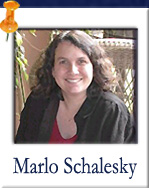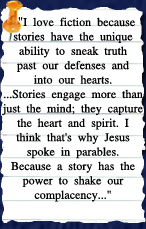


|
Focus on Fiction is pleased to feature Marlo Schalesky In addition to writing novels, Marlo is a regular columnist for Power for Living. Her articles have also appeared in magazines such as Focus on the Family, Today's Christian Woman, Decision, and Discipleship Journal. Marlo holds a Chemistry degree from Stanford, is pursuing a Masters degree in Theology, and is a partner in a Mechanical Engineering firm. She makes her home in California with her husband, Bryan, and their two daughters.
|
|
Focus: Marlo, how many novels have you written for the Christian market? Marlo Schalesky: Three. The newest, Only the Wind Remembers, as well as Cry Freedom and its sequel Freedom's Shadow. Focus: Can you give us a brief synopsis of all three of these books? Marlo Schalesky: Only the Wind Remembers was inspired by the remarkable journey of Ishi, the last Yahi, who walked out of the woods in Oroville, California on August 29, 1911. He came to tell an ancient tale of his people. He came to change one woman's life forever. He was the last of his tribe, the only Stone Age Indian left in North America. Alone. Lonely. With no one who knew his true name. Allison was abandoned as a young child, deprived of a place to call home. Loneliness brought them together. Prejudice drove them apart. Only the Wind Remembers is their story, a story of finding hope in an alien world, of the beauty of unlikely friendships, and the wonder of discovering the only love that heals. Readers can view a sample chapter here. In Cry Freedom, the year is 1743, a time of adventure, hope, and betrayal. In the English colonies a religious revival, which will later be named The Great Awakening, is sweeping through every class of people, drawing the wealthy and common alike into a new and personal experience with God. But on the Pennsylvanian frontier, the drums of war have begun to beat. French-led Shawnee war bands advance. Settlers tremble. Brave men, driven by the hope of freedom, grip their muskets in desperate hands. And, in the midst of war, Kwelik, daughter of an English missionary and Delaware Indian, dreams of what it means to be free. Instead of finding freedom, her village burns and she is sold into slavery. But nothing threatens her dreams as much as the whisper of forbidden love and the question of whether she'll ever be brave enough to stand against the fire of her fears. When the choice comes, will Kwelik dare to sacrifice everything she's hoped for to find the freedom of following God . . . even when He leads her into the flames? Freedom's Shadow, the sequel to Cry Freedom, is the story of three people bound by the pain of the past, shackled by bonds of unforgiveness. For them, freedom is only a dream, and peace is as elusive as a shadow. Annie, driven by fury and pain, wants nothing more than revenge against the Indians who killed her family and kidnapped her as a child. White Wolf, proud Lenape warrior, wants to be free of the choices of hate that have taken everything he once loved. For Jonathan Grant, it's time to face his past and the brother who once betrayed him. Their three lives entangle on a wild journey from the Pennsylvania frontier to the gallows of England. Focus: Rumor has it you're working on another historical fiction right now--this one a mystery. Can you give our readers a sneak preview of this story? Marlo Schalesky: The novel I'm working on now (tentatively titled Firefall) is set in 1894, Hinckley, Minnesota and explores a real historical mystery. On September 1, 1894, one of the worst fires in history ravaged east central Minnesota. It was the first firestorm in Minnesota history, destroying six towns, including Hinckley. Descending on the towns like a red demon, the fire consumed 400 square miles, killing 418 people in four hours. The maelstrom of flames caught the townspeople unaware. Five hundred were saved on the train to Duluth, with a bridge disintegrating into the fire only minutes after the train passed. Another hundred were saved in the gravel pit, where they desperately poured water on each other to keep their clothes from catching fire in the intense heat. A few others were saved in potato patches, water barrels, and by sheer grace. After the fire, the townspeople rebuilt their town, but in the midst of rebuilding, a rumor began of a hermit in the hills - a person severely burned, disfigured beyond recognition. The identity of this person was never determined, and it remains to this day a mystery, a myth, a shadowed figure whispered about in tales passed from grandparents to grandchildren. Who was this monster in the hills? Focus: Salman Rushdie has been quoted as saying, "Books choose their authors; the act of creation is not entirely a rational and conscious one." Is this true for you? Absolutely! Many times I've tried to sit down and "think up a story." Every time I've failed miserably. Instead, my stories spring up unexpectedly from snatches of conversation, bits of dreams, and interesting tidbits I come across in my reading. And even then the story that I end up writing is far different from the one I initially envision. More importantly, for me, a story is not my own, but rather an attempt to discover the tale that God wants to tell through me. My work is not so much a result of my own creativity (thank goodness!) but an act of faithfulness to God, of sitting down with my computer every day and seeking to follow God's lead, seeking to find the words, the story, the vision that he has for me on that day. That makes my writing very much an adventure of discovery of the tale God wants to tell and also of the gems of truth and beauty that he has hidden within the journey between "chapter one" and "the end." Focus: Few Christian writers have stories with main characters of Native American descent. Can you tell us what inspired your choice, and what challenges you've faced as a result? Marlo Schalesky: I've always loved the mystery and mystique of Native American culture. And I enjoy learning about how the gospel message was heard and has made inroads into a culture that is so different from my own. People often ask me if I am Native American, to which I say, "a little, at least I think so." Both my mother and my paternal grandmother talked about having some Native American blood in their ancestry. So, I guess my curiosity has always been peaked regarding Native American culture and history. But, as you mentioned, there are challenges connected with having Native American main characters in Christian fiction. When I wrote my first novel, Cry Freedom, publishers were concerned about the Native American themes and characters. "Christians will think it's a New Age book," I was told. New Age? Just because a character is Native American? I thought about the missionary work of people such as David Brainerd in the 1740's. I thought of many Native American Christians, especially those I knew about at Sun Valley Indian School in Arizona. And I wondered, what it is about us that makes us assume certain people have nothing to offer in the way of insight about the gospel? Why do we assume that some people couldn't possibly know Jesus? I played on this prejudice in Only the Wind Remembers. One of the points of the book is that God can, and often does, put his fingerprints on other cultures, even pagan cultures. Focus: In your book, Only the Wind Remembers, Ishi tells an amazing story about the redemptive love of the 'Great Eagle'. Have you found that many cultures, though not inherently Christian, possess knowledge of the truth of Christ? Marlo Schalesky: Yes! I believe that God has placed metaphors of the truth of Christ in every culture. He has prepared the soil, so to speak, of every culture to receive the good news of Christ. What first got me thinking about this was a class I took a couple years ago, "Christian Worldview and Contemporary Challenges" taught by Dr. Richard Mouw, the President of Fuller Seminary (where I'm working toward my Masters in Theology). He told about a tribe deep in the jungles of South America. Despite many efforts, missionaries were unable to make any inroads with the gospel with the members of this tribe. They explained the gospel again and again, but the tribe members didn't understand. Nothing helped, until one day the missionaries discovered a tribal custom of offering a "peace child" to a tribe with whom they were at war. The tribe would take a newborn son and offer him to the other tribe, to live in that tribe and be brought up as one of them. Through that son, the tribes would be at peace. Once the missionaries made the connection of Jesus as God's "peace child," the entire tribe converted. Here was good news that they could understand! Focus: In the last few pages of Only the Wind Remembers, you expressed your hope that readers regain some of the "wow of what Jesus did". What do you believe has caused Christians to lose our wonder over the salvation message? Marlo Schalesky: Three main things, I think. First, we've heard it before. For many of us, we've heard it since we were children. The gospel has become "old news," and therefore we are no longer gripped, or shocked, or surprised by Christ's incredible work on the cross. That's one reason why I wrote Only the Wind Remembers. I wanted to give readers a chance to look at the gospel again, in a new way, and hopefully be impacted by the wonder of it. Second, our pace of life is often so fast that we don't stop to ponder Christ's death and resurrection. We are so busy trying to do, do, do, even in our spiritual lives, that we fail to allow the wonder to sink into our hearts. Also, I've noticed a desire, especially in American Christians, to hurry past the pain of the cross to get to the empty tomb. We want to rush by the uncomfortable part of the gospel, the beatings, the mocking, the thorny crown, the blackness, the death, to get to the joy of the resurrection. But it's not possible to fully experience the wonder of the resurrection if we don't first go through the deep darkness of the cross. Focus: Besides re-inspiring an awe of God, what do you feel is the greatest message with which God has entrusted you, and why have you chosen fiction as your medium for that message? Marlo Schalesky: My hope and my prayer is that through my stories the wonder of the gospel, the wonder of God's love, will be rekindled in the hearts of my readers. But, honestly, when I consider what other message he's entrusted me with, I have to admit that he seems to have entrusted me with more questions than answers, more "what does it mean" than "I've figured it out!" I find that I am not a grand truth-bestower after all, but just a fellow seeker, an awe-struck follower who is looking for the ways that God is uniquely revealing the nuances of faith to me so I can shed light into a few shadowed corners for others. For me, a book is a journey, and I'm often not sure what truth God will reveal in the end. But always I find my own questions, my own doubts, are woven through the text, and at the end I, too, have discovered something new, something deeper, about the God I love. So why fiction? I love fiction because stories have the unique ability to sneak truth past our defenses and into our hearts. Stories illuminate the truth and shine it into the deepest parts of our lives. Stories engage more than just the mind; they capture the heart and spirit. I think that's why Jesus spoke in parables. Because a story has the power to shake our complacency, challenge our assumptions, and break down our walls of stubbornness. Focus: How have you been changed as a person through your writing? Marlo Schalesky: Well, I suppose I ought to have all kinds of wonderful things to say about how writing has made me into a better, wiser, happier person. And perhaps it has . . . sometimes. But all in all, I've found that writing is HARD! It's fraught with disappointments, discouragement, and the temptation to just throw in the towel and take life easy for a change! (Oh my, I'm going to destroy everyone's image of the peaceful writer typing away blissfully at her cabin in the mountains while the birds trill and the sunlight reflects off the duckpond outside the window.) So, why do I do it? I guess because writing has changed me after all. It's taught me to persevere through the difficulties, to press closer to God, to not settle for the easy answers but wrestle with the tough questions of life and faith. Writing has taught me that God's love can't be measured by my successes and failures. I've learned that my life, too, is a story that God is writing. And since the best stories have conflict, disappointments, and plenty of action, I shouldn't be surprised when my life takes a turn and my faith is challenged once again. I guess the bottom line is that writing has challenged and continues to challenge me to dig deeper with God. It lays bare the imperfections of my soul, stirs my doubts and questions, and drives me into the throne room of God. Focus: Besides writing to you and visiting your website, how can your readers and fans encourage you? Marlo Schalesky: Oh, I love to hear from readers! A single email from someone who's enjoyed my book is enough to brighten my whole day. But besides that, I love to hear how a reader has recommended one of my books to a friend, or bought a book for a family member, or found one of my books on the bookstore shelves and turned it "cover out." Mostly what I hope for is to hear from readers who have read my books and been touched or changed or challenged by them. These are the stories that motivate me to keep going during the tough times, to persevere through distractions, and writers block, and times of discouragement, to write the next scene, discover the next plot twist, and stay faithful to the call of God. Focus: Is there anything else you would like your readers to know? Marlo Schalesky: Well, I'd love to tell my Bethany story! You see, when I first started writing Only the Wind Remembers, my daughter Bethany was two years old. When I finished, she had just passed her third birthday. Much changed in the course of a year. She'd learned how to count to ten, to recognize her ABC's, to make poo-poos in the potty, and to sing "tinkle tinkle little tar" in a voice loud enough to shake dust from the rafters. But, more importantly, she had discovered the wonder of Jesus. It was her wonder that kindled my own. Nearly every night since, as she crawls into bed and pulls the blanket up under her chin, she says, "You want to tell me about Jesus? Tell me about Jesus on the cross." And so I tell her the story again. I talk about how they nailed Jesus to the cross, how the sky turned black, how he died and the curtain in the temple was torn in two. "That's sad, Mommy," she always says as she clutches the sea otter toy we bought her for her birthday. Next, I tell her how they took Jesus down from the cross and put him the tomb for one day . . . two days . . . three days (she loves to count the days on her fingers). Then my voice grows quiet. "The ground shook. The stone rolled away, and--" I stop. Bethany finishes the story with a shout. "Him not die anymore! Him risen!" We laugh together, and then I say, "And that is the most wonderful, incredible, amazing, important thing that has ever happened in the whole wide world from the beginning of time until now." Her eyes grow wide. She snuggles deeper into her blankets, and whispers, "Wow." And it is "wow." She sees the story of Jesus through new eyes. She understands the wonder. And when I begin to see the good news through her eyes, I can see the wonder too. So, through Only the Wind Remembers, I pray that you, too, will regain some of the wonder, some of the "wow," of what Jesus did for you. May He wrap you in His wings of love, and may you fly with Him into the winds of truth and beauty!
|











© Focus on Fiction, 2003-2005 All Rights Reserved. Site maintained by PulsePoint Design. Direct questions or comments here
| Home | Upcoming Author Interviews | Past Author Interviews | Christian Fiction Reviews | About Us | | FAQ’s | Contact Us | Links |